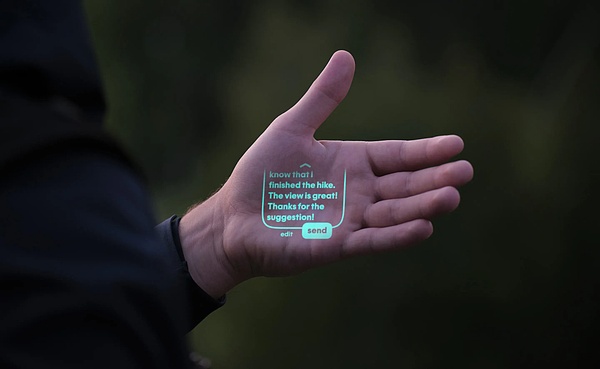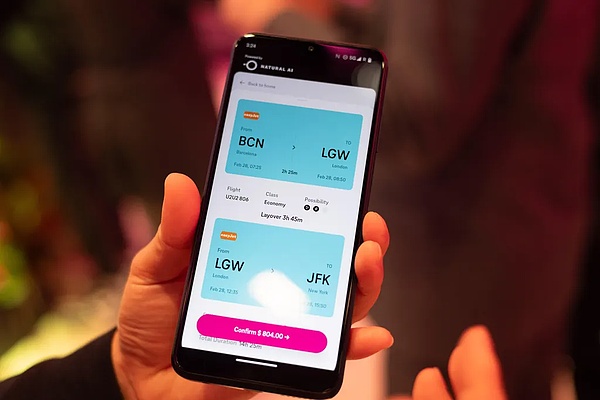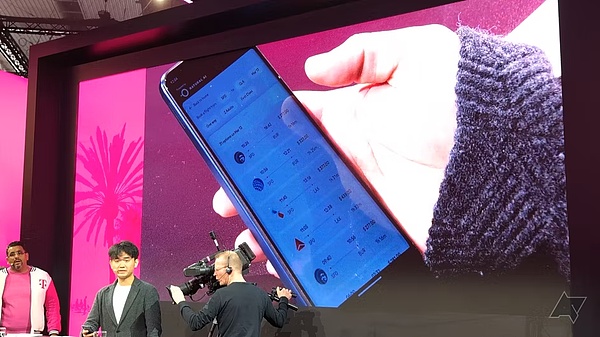Author: Tang Yitao; Geek Park
The AI Pin of AI startup Humane should be regarded as MWC (World Mobile Communications) The most eye-catching star product at the conference). As a completely AI native product, AI Pin meets people's long-standing expectations for hardware innovation. Open AI's technology embedded, laser projection, and gesture operations make AI Pin look like a very cool product. But if we treat it according to the standards of mass-produced consumer products, AI Pin is obviously not a qualified product.
For example, laser projection is the embodiment of Humaine's "screen-free" product concept, but the display effect is similar to that of a Casio electronic watch, far inferior to a mature OLED screen;
 AI Pin laser projection | Image source: Humane
AI Pin laser projection | Image source: Humane
There is no localized application and it relies heavily on the Internet. Judging from the live demonstration video, any AI answer requires a few seconds of waiting time;
The price is as high as US$699 (approximately RMB 5,023), in addition to US$24 per month ( (approximately 172 yuan) subscription fee;
Putting aside these, the most important thing is that it is difficult for AI Pin to answer a question: Since I already have a smartphone, why do I still need it? Need AI Pin?
The same problem applies to the rabbit r1 that stole the show at CES and sold 50,000 units in a few days.
Others have not taken such big steps. Also at MWC, German operator Deustche Telekom teamed up with AI startup Brain.ai to demonstrate an AI concept mobile phone, T-Phone.
They claim that this is a mobile phone without an App - will the T-Phone be the prototype of future AI mobile phones?
01 "No App" mobile phone
From a configuration perspective, T-Mobile can be said to be a standard cheap mobile phone: only 2GB of memory , Snapdragon 625 is a 14-nanometer processor released in 2016, with dual front and rear cameras of 15 million and 13 million pixels respectively.
The core concept is this: abandon the past mobile phone design around Apps, and instead use AI to use contextual predictions to generate interfaces to help users complete tasks. Therefore, when you light up the screen, the first thing that appears is an AI assistant interface. There is also a physical AI button on the side of the phone that can wake up the AI assistant at any time.
A typical scenario is shopping. When you ask it: "What should I buy for my bedridden grandma?", T-Phone will recommend related products based on your needs, from "bed table" to "neck support" U-shaped pillow".
If you are interested in this product, after clicking, AI will continue to generate detailed information about the product, including text, pictures and videos. After selecting the product you like, click on the picture and it will be added to the shopping cart on the third-party e-commerce platform.
Jerry Yue, founder and CEO of Brain.ai, said the system will attract about 7,000 e-commerce websites when it is officially launched.
In this case, T-Phone functions as an e-commerce aggregation platform.
Another example LeSheng shows is purchasing air tickets. He told the AI assistant to book two first-class tickets from Barcelona to Los Angeles on March 12. The phone paused for a moment, then generated a list of flights. Once LeSheng finds a suitable flight, he can pay using the mobile payment system of his choice without having to switch to another app or service.
 Use T-Phone to buy air tickets|Image source: CNET
Use T-Phone to buy air tickets|Image source: CNET
Not only shopping, users can ask AI to perform various operations, such as suggesting travel destinations, creating slideshows with photos, and posting to social media Media, drafting documents, etc.
T-Phone’s AI function is based on the combination of cloud and terminal. High energy-consuming tasks are processed by cloud AI to reduce the power consumption of the mobile phone; some low-power-consuming tasks can be directly processed by local AI to solve the delay caused by data transmission.
Brain.ai believes that due to the lack of context for these connections established by humans, today’s apps cannot dynamically adjust or adapt to human needs in real time, nor can they learn from past connections to adapt to new needs. . Another drawback of apps is that they are often built with the goal of keeping users addicted.
Sponsored Business Content
“We want to use artificial intelligence to do the exact opposite—put humans at the center of technology. You don’t go to the apps, the apps come to you. We want to give the power back to people.” Le Holy said.
Deutsche Telekom and Brain.ai predict that in ten years, you won’t remember apps anymore. You just talk to the AI and it does all the work for you.
 LeSheng shows off T-Phone at MWC|Image source: androidpolice
LeSheng shows off T-Phone at MWC|Image source: androidpolice
It sounds great, but it is still unclear how to set up return information, payment and other information; and once after-sales occurs The question is, how will the AI assistant help the user when a real customer needs to intervene.
Brain.ai once launched an AI assistant App in 2021 - Natural, which is highly similar in concept to T-Phone. Although the rating is as high as 4.7 stars, many also mentioned that there is no after-sales service and flight fares. More expensive and other issues.
In addition, what if the user just wants to use WeChat to chat or browse their mailbox? The addition of AI assistants in these scenarios will not make efficiency higher.
02 AI as a super entrance
Obviously T- The Phone is still in its early stages, which is why it's a "concept phone." At present, the official has only demonstrated a small number of usage scenarios, and they are not considered high-frequency. Trying to replace a traditional smartphone with such a phone is obviously difficult.
Actually, T-Phone is not a completely AI phone. Swipe the home screen up to enter the traditional Android strong>Interface. Essentially, the T-Phone is a traditional Android phone with an external AI shell.
This may be the smartest step in T-Phone’s product concept, because it does not try to subvert existing smartphones and uses the AI assistant as the first entry point to the phone.
Why is the entrance important? Because it is the first step in the expansion of all functions. Everyone who passes the entrance is a potential customer and may pay a toll.
When personal computers first emerged, Microsoft seized the entry point of the operating system. Software builds user scenarios, and hardware makes sense. At this time, all PC manufacturers are Microsoft users.
In the Internet era, Microsoft has seized the browser again and further consolidated the Windows operating system with its monopoly position.
Early Internet users had a habit of writing the URL on paper and typing it in letter by letter when accessing. So portals like Yahoo came into being.
After that, the number of websites exploded, and the efficiency of page turning and retrieval on portal websites was very low. Search engines like Google were born, and the business model of online advertising was built. To this day, online advertising is the main source of income for Meta, Baidu, and ByteDance.
Similar in concept to T-Phone rabbit r1. AI Pin assumes a scenario where everyone is eagerly waiting to be ready to enter the AI era. This may be an illusion created by AI, and no one is ready for this yet.
The iPhone didn’t come out of nowhere. Apple had experience making low-power devices like the iPod; flash memory needed to be viable at an affordable price point; Samsung needed to make good-enough processors; 3G networks needed to roll out; and the iTunes Music Store needed to provide the foundation for the App Store.
That all happened in 2007, and the mobile era exploded.
The iteration of technology is often gradual. From the emergence of new technology to the realization of the final result, there is a long iteration time in between. The new technology must be developed well enough; the conflict with the old technology must be intense enough before people will have the courage to cut it off.
From this perspective, T-Phone is not a mobile phone that does not require an App. Instead, it's a phone that relies heavily on the existing app ecosystem, which is why it's more likely to succeed - people may not be ready to enter a world without apps, but many people should be happy to reduce some of the things on their phones. App.
 Wilfred
Wilfred
 Wilfred
Wilfred Weatherly
Weatherly Zoey
Zoey JinseFinance
JinseFinance Sanya
Sanya Catherine
Catherine Beincrypto
Beincrypto Bitcoinist
Bitcoinist Cointelegraph
Cointelegraph Cointelegraph
Cointelegraph